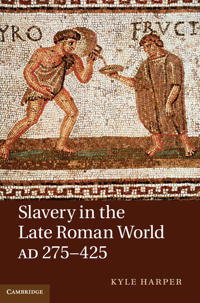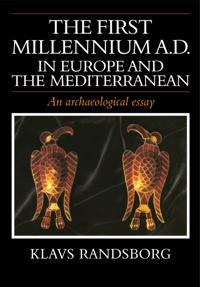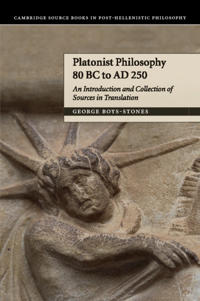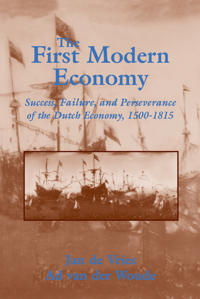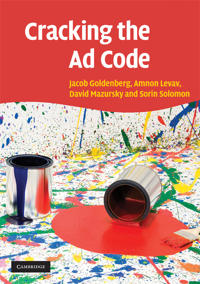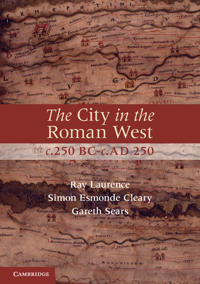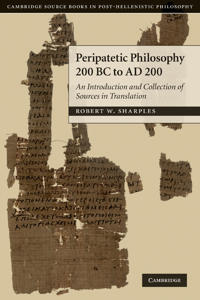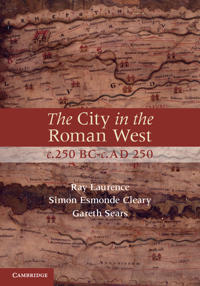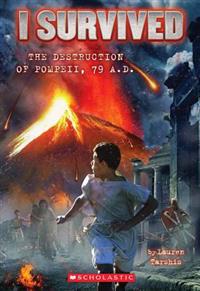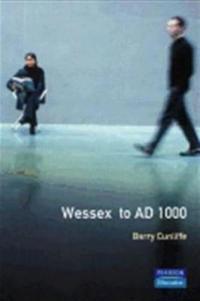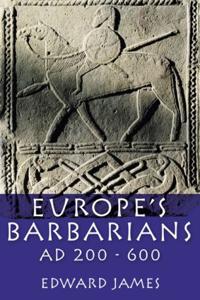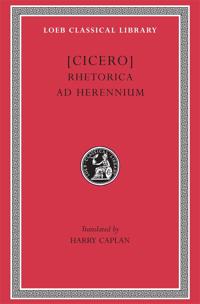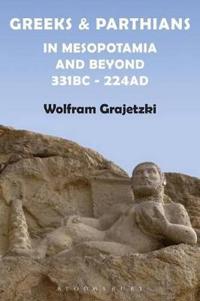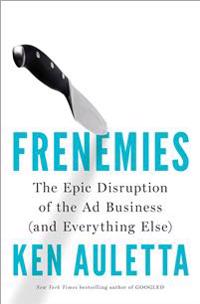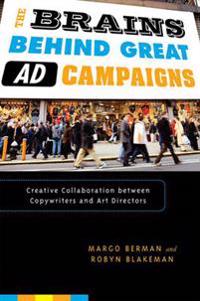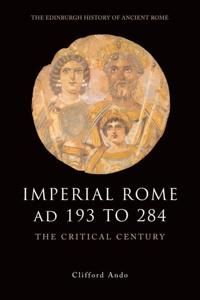The Roman West, Ad 200-500 (Inbunden)
avSimon Esmonde Cleary
ISBN: 9780521196499 - UTGIVEN: 2013-03-07Focuses on the archaeological evidence, allowing fresh perspectives and new approaches to the fate of the Roman West.[...]
Slavery in the Late Roman World, AD 275-425 (Inbunden)
avCindy Keefer, Jaap Guldemond
ISBN: 9780521198615 - UTGIVEN: 201105Capitalizing on the rich historical record of late antiquity, and employing sophisticated methodologies from social and economic history, this book reinterprets the end of Roman slavery. Kyle Harper challenges traditional interpretations of a transition from antiquity to the Middle Ages, arguing ins[...]
The First Millennium AD in Europe and the Mediterranean (Häftad)
avKlavs Randsborg
ISBN: 9780521387873 - UTGIVEN: 199101Modern archaeology, with its huge methodological repertoire, its interdisciplinary orientation and its rapidly expanding basis in excavations, is beginning to rewrite history, and to reshape our views of the development of Europe prior to the present millennium. Archaeological evidence draws attenti[...]
Platonist Philosophy 80 BC to AD 250 (häftad)
ISBN: 9780521547390 - UTGIVEN: 2019-05'Middle' Platonism has some claim to be the single most influential philosophical movement of the last two thousand years, as the common background to 'Neoplatonism' and the early development of Christian theology. This book breaks with the tradition of considering it primarily in terms of its sourc[...]
The First Modern Economy (Pocket)
avJan De Vries, Ad Van Der Woude, Jan De Vries
ISBN: 9780521578257 - UTGIVEN: 1997-06The First Modern Economy, first published in 1997, provides a comprehensive economic history of the Netherlands during its rise to European economic leadership, the 'Golden Age', and subsequent decline (1500-1815). The authors argue that it was the first modern economy, and defend their position wit[...]
Cracking the Ad Code (Häftad)
avJacob Goldenberg, Ammon Levav, David Mazursky
ISBN: 9780521675970 - UTGIVEN: 200904Do you need to produce successful creative ideas in advertising? If so, then you need this book. For the first time, the secret of inventing new creative campaigns is unlocked, and practical tools are presented to allow quick production of creative ideas in marketing communications. Along with over [...]
The City in the Roman West, c. 250 BC - c. AD 250 (Pocket)
avRay Laurence, Simon Esmonde Cleary, Gareth Sears
ISBN: 9780521701402 - UTGIVEN: 201108The city is widely regarded as the most characteristic expression of the social, cultural and economic formations of the Roman Empire. This was especially true in the Latin-speaking West, where urbanism was much less deeply ingrained than in the Greek-speaking East but where networks of cities grew [...]
Peripatetic Philosophy, 200 BC to AD 200 (Häftad)
avR. W. Sharples
ISBN: 9780521711852 - UTGIVEN: 2010-10This book provides a collection of sources, many of them fragmentary and previously scattered and hard to access, for the development of Peripatetic philosophy in the later Hellenistic period and the early Roman Empire. It also supplies the background against which the first commentator on Aristotle[...]
Platonist Philosophy 80 Bc to Ad 250
ISBN: 9780521838580 - UTGIVEN: 2017-12'Middle' Platonism has some claim to be the single most influential philosophical movement of the last two thousand years, as the common background to 'Neoplatonism' and the early development of Christian theology. This book breaks with the tradition of considering it primarily in terms of its sourc[...]
Cracking the Ad Code (Inbunden)
avJacob Goldenberg, Ammon Levav, David Mazursky, Sorin Solomon
ISBN: 9780521859059 - UTGIVEN: 2009-04-27The City in the Roman West c.250 BC-c.AD 250
ISBN: 9780521877503 - UTGIVEN: 2011-08The city is widely regarded as the most characteristic expression of the social, cultural and economic formations of the Roman Empire. This was especially true in the Latin-speaking West, where urbanism was much less deeply ingrained than in the Greek-speaking East but where networks of cities grew [...]
The Destruction of Pompeii, AD 79 (Häftad)
avLauren Tarshis, Scott Dawson
ISBN: 9780545459396 - UTGIVEN: 2014-08During the infamous eruption of Mount Vesuvius, one boy struggles to escape. Can he survive the most devastating disaster of ancient times?
In this thrilling addition to the bestselling I SURVIVED series, readers are taken back to antiquity with a young boy trying to escape as the giant Mount Ve[...]Wessex to 1000 Ad
ISBN: 9780582492806 - UTGIVEN: 1993-03Wessex -- the ancient counties of Dorset, Somerset, Wiltshire, Hampshire and Berkshire -- is remarkable for its economic and social cohesion as a region, and for the extraordinary wealth of its ancient remains. In this authoritative survey, Barry Cunliffe sets the great monuments and famous sites in[...]
Europe's Barbarians AD 200-600 (Häftad)
avEdward James
ISBN: 9780582772960 - UTGIVEN: 200906'Barbarians' is the name the Romans gave to those who lived beyond the frontiers of the Roman Empire - the peoples they considered 'uncivilised'. Most of the written sources concerning the barbarians come from the Romans too, and as such, need to be treated with caution. Only archaeology allows us t[...]
Rhetorica ad Herennium (Inbunden)
avMarcus Tullius Cicero
ISBN: 9780674994447 - UTGIVEN: 198907Cicero (Marcus Tullius, 106-43 BCE), Roman lawyer, orator, politician and philosopher, of whom we know more than of any other Roman, lived through the stirring era which saw the rise, dictatorship, and death of Julius Caesar in a tottering republic. In his political speeches especially and in his co[...]
Greeks and Parthians in Mesopotamia and Beyond, 331 BC-AD 224 (Häftad)
avWolfram Grajetzki
ISBN: 9780715639474 - UTGIVEN: 2011-04Greeks and Parthians is an innovative, archaeologically based investigation into urban life in Mesopotamia and the northern part of what is now the Persian Gulf, from the arrival of Alexander the Great to the end of the Parthian Empire. With detailed coverage of the cities of Seleucia-Ktesiphon, Bab[...]
Frenemies: The Epic Disruption of the Ad Business (and Everything Else)
ISBN: 9780735220867 - UTGIVEN: 2018-06An intimate and profound reckoning with the changes buffeting the $2 trillion global advertising and marketing business from the perspective of its most powerful players, by the bestselling author of Googled Advertising and marketing touches on every corner of our lives, and is the invisible fuel po[...]
The Brains Behind Great Ad Campaigns: Creative Collaboration Between Copywriters and Art Directors (Häftad)
avMargo Berman, Robyn Blakeman
ISBN: 9780742555518 - UTGIVEN: 200907Catch an inside look at the advertising creative process. Discover how teams collaborate at major agencies to create unforgettable campaigns like the Budweiser _Clydesdale and Dalmatian_ spots, the _PEDIGREE_ Adoption Drive_ program, or the breakthrough UPS _Whiteboard_ campaign.[...]
Augustan Rome 44 Bc To Ad 14 (Pocket)
avJohn Richardson
ISBN: 9780748619559 - UTGIVEN: 2009-06-01The reign of Augustus, the first of the Roman emperors, has been seen, both by contemporaries and over the centuries that have followed, as a pivotal moment in the history of Rome. The final stage in the move to monarchical government and the structures he put in place, which were to last largely un[...]
Imperial Rome AD 193 to 284 (Häftad)
avClifford Ando
ISBN: 9780748620517 - UTGIVEN: 201206This title presents a pioneering history of this 'period of crisis' for the Roman Empire. The Roman empire during the period framed by the accession of Septimus Severus in 193 and the rise of Diocletian in 284 has conventionally been regarded as one of crisis. Between 235 and 284, at least 18 men he[...]
Imperial Rome Ad 284 To 363 (Pocket)
avJill Harries
ISBN: 9780748620531 - UTGIVEN: 2012-03-06This book is about the reinvention of the Roman Empire during the eighty years between the accession of Diocletian and the death of Julian.[...]
From Rome To Byzantium Ad 363 To 565 (Pocket)
avA. D. Lee
ISBN: 9780748627912 - UTGIVEN: 2013-01-14The Transformation of Ancient Rome. Outlines the significant developments in the Roman Empire during the period AD 363 to 565.[...]


